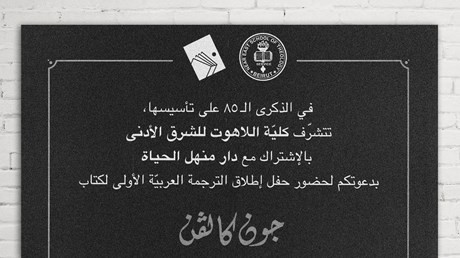Labor of love brings the Reformation’s seminal work into the Middle East.

Most of the theological writings that shaped Western society over the last 500 years cannot be found on Middle Eastern bookshelves. Few Arabs have ever read anything from John Calvin, Jonathan Edwards, or Karl Barth.
The reason is simple: Almost none of the Protestant canon has been translated into Arabic.
The dearth of Christian religious texts in the world’s fourth-largest language is especially pronounced within Protestantism, which developed in European languages such as Latin, French, German, and English. The Reformation has barely broken into the Arabic-speaking world, dominated by Islam and where most local Christians—whose numbers are dwindling fast—are inheritors of Orthodox or Catholic theologies.
Nearly a decade ago, George Sabra, president of the Near East School of Theology (NEST) in Beirut, had the notion to translate perhaps the most influential writing of the Reformation, John Calvin’s Institutes of the Christian Religion, into Arabic for the first time.
“It’s a major work of the Reformation, which has shaped European and American Protestantism and societies for centuries and, in a way, is still with us,” Sabra said of the French reformer’s systematic theology. “The effects of it—the whole Calvinist influence on society and in the church—are still there, even though people don’t recognize it.”
In 2008, Sabra brought the idea to NEST’s then-president, Mary Mikhael. She was receptive and helped raise funds. The process of finding a translator and ensuring consistency throughout the manuscript caused delays, but a little less than a decade later—just in time for the 500th anniversary of the Reformation—Sabra’s dream …
Source: Christianity Today Most Read